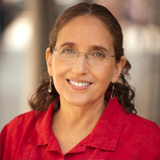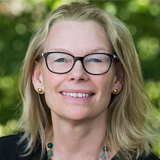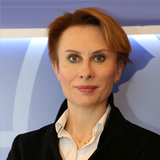The Opportunities and Challenges for Developing Countries
Keynote presenter:
Dr. Ruth DeFries, Sustainability Development Professor, Columbia University
Moderator:
Karolina Mzyk Callias, Global Team Leader, SDG Philanthropy Platform, UNDP, Istanbul, Turkey
Panelists:
Mohammad Muslim Chowdhury, Secretary, Finance Division, Ministry of Finance, Government of Bangladesh
Heather Grady, Vice President, Rockefeller Philanthropy Advisors
Ajit Zacharias, Senior Scholar, Levy Economics Institute, Bard College
Jenny Perlman Robinson, Fellow, Center for Universal Education, The Brookings Institution
Session 3 began with a Keynote Presentation from Ruth DeFries who started by highlighting the importance of accommodating wildlife movement and ecosystem services amidst infrastructure expansion. The problem, in her opinion, lies in the fact that adequate infrastructure has not yet been built. Wildlife needs to move but the problem is that roads and rails sever connectivity required for genetic viability of populations. Upstream dams also sever flow of freshwater and sediment to delta. Technical solutions to these problems exist like overpasses. Water connectivity issues can also be solved by restoring the Mississippi river delta. According to her, the hurdles are not technical but require decision-making across administrative boundaries. Also, it is important to breakdown multi-sector decision making. It is important to develop infrastructure but that has to be done while maintaining the health of ecosystems. Integrating accommodation for ecosystems is a small slice of overall budgets for infrastructure projects. SDGs value non-human life, planet and environment. We can create synergies among these different actors tat are involved.
SDGs can be achieved holistically and simultaneously where we are not picking and choosing one over the other; this is not so much of a technical issue but does require thinking across administrative boundaries and taking into account all dimensions of the project from the beginning.

Ruth DeFries
Denning Family Professor, Sustainable Development, Columbia University, New York
Muhammad Muslim Chowdhury noted that financing is required to meet the SDGs. Bangladesh government has factored the goals in the seven five-year plans. Projects have also been identified such as power projects, climate change programs, etc. He also noted that NGO involvement is very vibrant in Bangladesh, and they are involved in the process of implementing SDGs.
Heather Grady stressed on the fact that we cannot approach SDGs from a purely technical angle. MDGs did not include much talk about systems-thinking. However SDGs are perfect frameworks to incorporate these practices. She highlighted that systems-thinking experts are embracing SDGs. The best approaches in system-approaches involve 4 powerful levers: policy reform and development, market approaches, behavior change and social movements, developing technologies including AI and machine learning. She then mentioned some of the strategies by philanthropies. Rockefeller, for example, is working on urban sustainable development and urban resilience.
All of us in philanthropy, government departments and UN agencies, are all looking at specific problems and challenges to solve, whereas all of these sit within larger, complex, adaptive systems. If we don’t think about getting out of our silos and working across environmental, economic and social issues, we won’t be incorporating a systems approach.

Heather Grady
Vice President, Rockefeller Philanthropy Advisors, New York
Jenny Perlman Robinson pointed out that her organization, Center for Universal Education is looking into what it takes to achieve inclusion and lifelong learning. They have seen that local solutions work but that they are not adding up in a global scale and translating into policy. Both political and technical considerations should be taken into account in this case. There are four core underlying contributions including designing for scale – whether it be government, open source, market based, delivery scale – much as we talk about champions, there are indeed losers, so we need to align incentives, financing and an enabling environment. She highlighted that there needs to be systems that are evidence based and adaptive.
Ajit Zacharias commented on the theme of systems-thinking and innovation. The core elements include approximation to the command the individual has according to Adam Smith’s theory. He said that standard approximation is the consumption expenditure and income. He elaborated that the other approach is to check what the measure seeks to do and argue why it fails to do so. A factor that did not appear in the MDGs but does in the SDGs is gender equality. There are two important targets that were discussed: equitable growth and,nt jobs & full employment. Mr. Zacharias concluded his speech by discussing about innovations- systems thinking and interdisciplinary approach to SDGs. Poverty reduction is important but we also need to think about gender equality. Equitable growth is also important - fruits of economic growth has to be redistributed and decent work is also important. This requires systems thinking. Consumption expenditures or income are standard indicators for policy-making. But there are limitations, it’s not just income that matters but also education, health etc. At the Levy institute they are trying to understand measurement and mismeasurment, blind spots and how that impacts policymaking.
The good news is that the financing and the solutions for the SDGs are there, we just need the political will to push them forward.

Karolina Mzyk Callias
Global Team Leader, SDG Philanthropy Platform, UNDP, Istanbul, Turkey
The Intra panel discussion deliberated on the different actors in SDG implementation. Ms. Robinson explained that the goals of the actors are aligned but processes are different. In education, government is not absolved of primary responsibility of ensuring quality education for all. In Jordan, they made literacy as the mainstream education program, and adapted best practices by different groups, and was financed by banks. Thus, we see that the key is to bring everyone in on different roles. The discussion then focused on calculating alternative measurements and whether alternative measurement increase country ratings. Mr. Zacharias explained that it requires a technical approach and to address the question, we talk about data availability. The alternative measure he talked about involves a time component – and this is about the time that is implicit in the poverty line. There is no recognition on how there are time constraints on unpaid activities like meal serving. Ms. Grady highlighted that Rockefeller recently produced a report on scalability and that businesses need to shift models so that they are working toward a sustainable future.